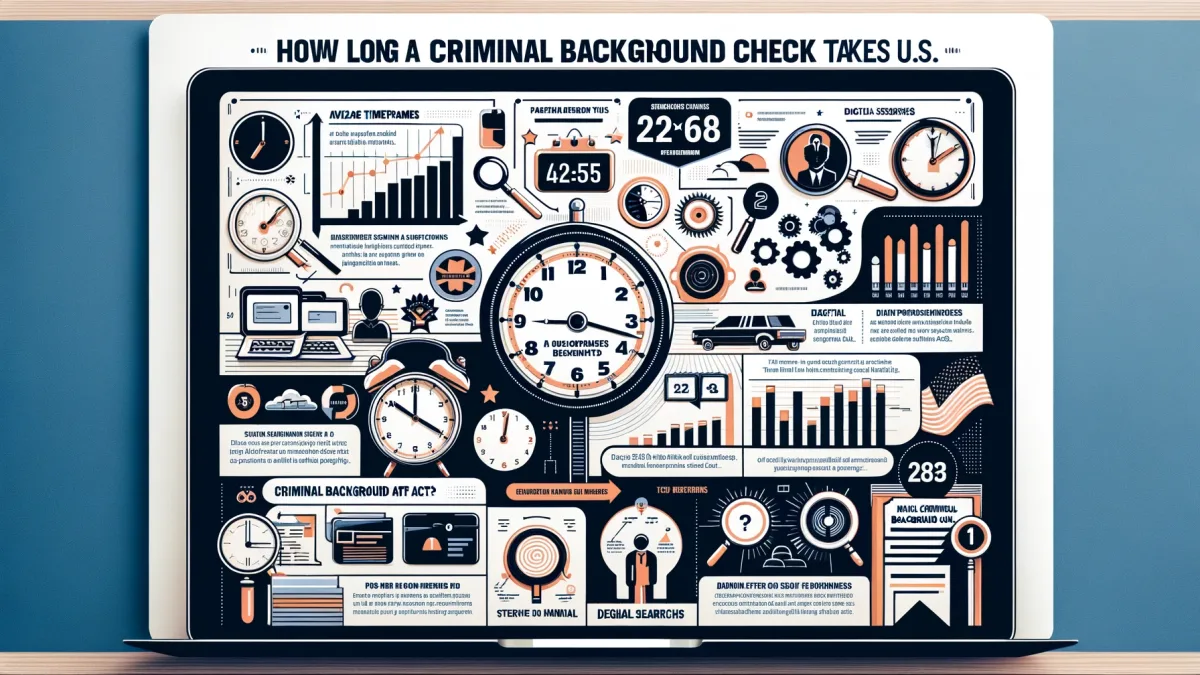If you’re navigating the waters of employment, volunteering, or any situation requiring a clean legal slate, you’ve likely encountered the pivotal step of undergoing a criminal background check. But just how long does this process take in the U.S.? The answer isn’t as straightforward as one might hope. Let’s dissect the timeframe and factors influencing the duration of a criminal check, all while keeping the legalese to a minimum.
The Basics of Criminal Background Checks
First things first, a criminal background check is a dive into an individual’s legal history, searching for any criminal records that might include arrests, convictions, and even traffic violations, depending on the depth of the check. These checks are crucial for employers, organizations, and certain legal processes to ensure safety and compliance with regulations.
Standard Timelines
On average, a basic criminal background check can take anywhere from one to three days. However, this is a best-case scenario, often applicable when checks are conducted within a single jurisdiction or through automated online databases. But as you’ll soon see, the “average” doesn’t always apply.
Factors Affecting the Duration of a Criminal Check
Several elements can extend the time from a few days to several weeks or even months. Understanding these can help set realistic expectations.
1. Scope of the Search
- Local vs. National: Checks that require combing through records from multiple jurisdictions, including state and federal levels, naturally take longer.
- International Checks: For those with history outside the U.S., international criminal checks introduce additional layers of complexity and time.
2. Manual Searches
While digital databases have streamlined the process, not all records are digitized, especially older or less common ones. Manual searches require human intervention, significantly extending the timeline.
3. Court Delays
Accessing court records can be delayed due to limited staff, reduced hours (a remnant challenge from pandemic closures), or backlogs in requests. Each court operates differently, which can add unpredictability to the process.
4. Accuracy and Disputes
Ensuring the accuracy of a criminal background check is critical, as mistakes can have serious implications. If inaccuracies are found, disputing and correcting these records adds to the overall duration.
Tips for Streamlining the Process
While some aspects of the timeline are out of one’s control, there are ways to facilitate a smoother and potentially quicker background check.
- Provide Complete Information: Ensuring all submitted information is accurate and comprehensive can help avoid delays in matching records.
- Consent and Cooperation: Promptly providing consent and any additional requested information can keep the process moving.
- Use Reputable Services: For employers or individuals initiating the check, opting for reputable screening services known for efficiency can make a difference.
Legal Implications and Rights
It’s essential to note that criminal background checks are subject to legal regulations, primarily under the Fair Credit Reporting Act (FCRA) in the U.S., which ensures the accuracy, fairness, and privacy of the information. Individuals have the right to know if information from a criminal check is being used against them in decisions like employment, and they have the right to dispute inaccuracies.
Conclusion: Patience is Key
The duration of a criminal background check in the U.S. is influenced by a variety of factors, from the scope of the search to manual processing needs. While waiting for the results can be a test of patience, understanding the complexities involved can help manage expectations. Whether you’re an employer, volunteer, or job seeker, it’s crucial to approach the process with an understanding of its potential breadth and depth.
Remember, the goal of a criminal background check is to promote safety and integrity, serving as a vital step in many of life’s significant milestones. So, whether you’re on the waiting end or initiating the check, know that this process, while sometimes lengthy, plays a crucial role in building trust and safety in numerous contexts across the U.S.









Leave a Reply